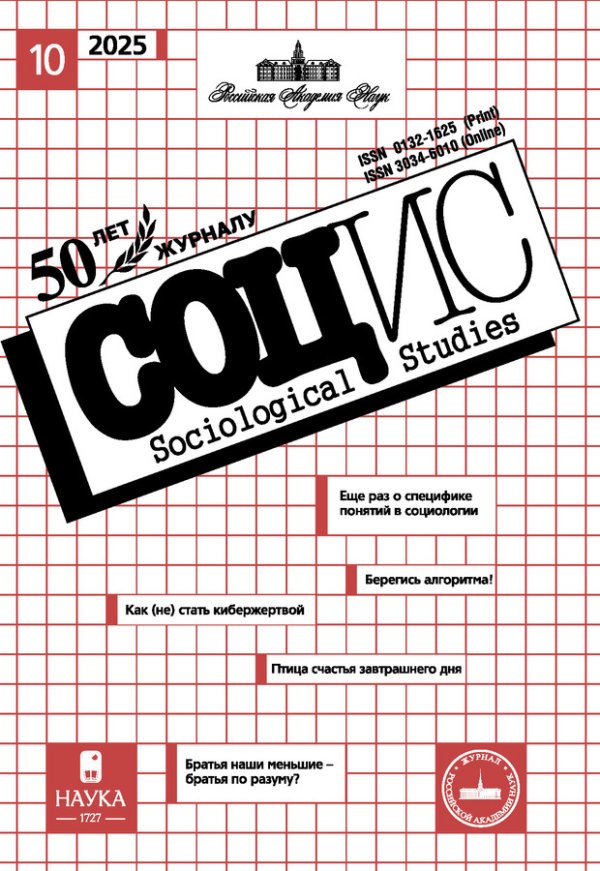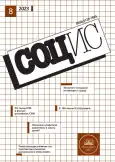Trust as a Private Good in the Context of Social Capital
- Authors: Mond D.L.1
-
Affiliations:
- Independent Researcher
- Issue: No 8 (2023)
- Pages: 143-153
- Section: Articles
- URL: https://rjsvd.com/0132-1625/article/view/661820
- DOI: https://doi.org/10.31857/S013216250027377-7
- ID: 661820
Cite item
Abstract
The purpose of thе article is to conceptualize trust as a private good. This purpose is relevant because today social capital is simultaneously studied in fundamentally different paradigms – as private and as public good. As a result, we cannot get a clear definition of social capital. One of the reasons for this duality is that the key element of social capital, i.e. trust, is studied in different paradigms. The rule of law and personal reputation create trust in a person, but the former is usually considered the property of society, and the latter is usually considered the property of a particular individual. In this light, the question of the possibility to conceptualize trust exclusively in one of the paradigms becomes relevant. First, the author describes his concept of social capital, defines trust and describes its role in the context of social capital. Trust sources are then divided into three types: subject properties, object properties, and context properties. On this basis, three pure types of trust are distinguished (baseline, personal, collective) and a composite one (categorical). Further, they are tied to a specific social unit with the help of an auxiliary concept of the collective, thus demonstrating fundamental possibility of conceptualizing trust as a private good. Special attention is paid to the role of institutions in creating trust, which the author deems to consider as properties of a collective. In conclusion, the logic of converting types of trust into each other is described.
Keywords
References
- Штомпка П. Доверие – основа общества. М.: Логос, 2012.
- Banfield E.C., Banfield L.F. (1975) The moral basis of a backward society. New York: Free Press etc.
- Bourdieu P. (1986) The forms of capital. In: Richardson J.G. (ed.) Handbook of Theory and Research for the Sociology of Education. New York, Greenwood Press: 241–258.
- Burt R.S. (2005) Brokerage and closure: an introduction to social capital. Oxford, Oxford University Press.
- Cawvey M., Hayes M., Canache D., Mondak J.J. (2018) Biological and Psychological Influences on Interpersonal and Political Trust. In: Uslaner E.M. (ed.) The Oxford Handbook of Social and Political Trust. New York, N.Y.: Oxford University Press: 119–147.
- Clément F. (2020) Trust: Perspectives in Psychology. In: Simon J. (ed.) The Routledge Handbook of Trust and Philosophy. New York, N.Y.: Routledge, Taylor & Francis Group: 205–213.
- Coleman S.J. (1988) Social capital in the creation of human capital. American Journal of Sociology. Vol. 94. Suppl.: 95–120.
- Dimock S. (2020) Trust and Cooperation. In: Simon J. (ed.) The Routledge Handbook of Trust and Philosophy. New York, N.Y.: Routledge, Taylor & Francis Group: 160–174.
- Fukuyama F. (1995) Trust: Social virtues and the creation of prosperity. New York: Free Press.
- Fukuyama F. (2001) Social capital, civil society and development. Third World Quarterly. No. 22(1): 7–20. doi: 10.1080/01436590020022547.
- Gambetta D., Hamill H. (2005) Streetwise: How taxi drivers establish their customers' trustworthiness. New York: Russell Sage.
- Granovetter M. (1992) Problems of explanation in economic sociology. In: Networks and organizations: Structure, form, and action. Ed. by N. Nohria, R.G. Eccles. Boston, Harvard Business School Press: 25–56.
- Lahno B. (2020) Trust and Emotion. In: Simon J. (ed.) The Routledge Handbook of Trust and Philosophy. Taylor & Francis: 147–159.
- Ledeneva A.V. (2013) Can Russia modernise? Sistema, Power Networks and informal governance. Cambridge: Cambridge University Press.
- Liden R.C. et al. (2014) Servant Leadership: Antecedents, Processes, and Outcomes. In: Day D.V. (ed.) The Oxford Handbook of Leadership and Organizations. New York: Oxford Univ. Press: 357–379.
- Lin N. (2004) Social capital: A theory of social structure and action. Cambridge, Cambridge University Press.
- Möllering G. (2001) The nature of trust: From Georg Simmel to a theory of expectation, interpretation and suspension. Sociology. Vol. 35(2): 403–420.
- Möllering G. (2006) Trust: Reason, routine, reflexivity. Elsevier.
- Nahapiet J., Ghoshal S. (1998) Social capital, intellectual capital, and the organizational advantage. Academy of Management Review. No. 23 (2): 242–266. doi: 10.2307/259373.
- Putnam R. (1995) Bowling alone: America’s declining social capital. Journal of Democracy. No. 6(1): 65–78. doi: 10.1353/jod.1995.0002.
- Schmid A.A. (2002) Using motive to distinguish social capital from its outputs. Journal of Economic Issues. No. 36 (3): 747–768. doi: 10.1080/00213624.2002.11506511; EDN EHEAJX.
- Uslaner E.M. (2018) The Study of Trust. In: Uslaner E.M. (ed.) The Oxford Handbook of Social and Political Trust. New York, N.Y.: Oxford University Press: 3–14
- Weber M. (1946) From Max Weber: Essays in Sociology. Transl., ed. and an introd. by H.H. Gerth, C.W. Mills. New York: Oxford University Press.
Supplementary files











